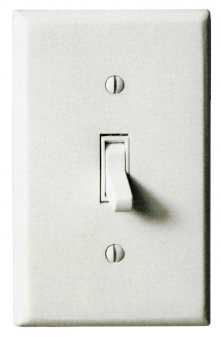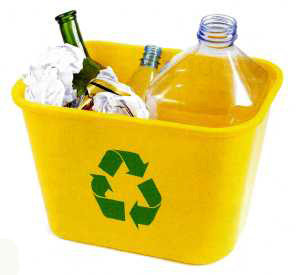 |
Home | Search | Browse | About IPO | Staff | Links |
 |
Home | Search | Browse | About IPO | Staff | Links |
30 I l l i n o i s P a r k s & R e c r e a t i o n www.ILipra.org
www.ILparks.org M a y / J u n e 2008 31 TIP 1 - A Little Darkness Lightens the Energy Drain 
Did you know lighting is responsible for about 11 percent of a home's energy bills? Or, maybe you just know that you'd like to write a smaller check to your energy provider. For whatever reason, people seem to have an easy time shutting off unneeded lights at home. But it seems a more difficult challenge to remember to flip off those switches during the business day. Look around. Is there a hallway with a lot of lights with switches that control every other light? Turn off one of the two. Is there an empty office with the lights on? Darken it. (For a good guideline, if you plan to be gone more than 10 minutes, you should turn the lights off.) Are there unneeded lights on during the weekend? Turn them off, just as you turn off all the lights in your house before you leave for work each morning. In the parks and recreation business, more savings can mean more money available for programming. And you can be proud of yourself for helping to save. And think about what kind of lights you're turning out. According to the U.S. Department of Energy, if every U.S. household changed just one light bulb or fixture to an Energy Star bulb, the country would realize an annual energy cost savings of $600 million (and enough energy to light three million homes and prevent greenhouse gases equivalent to the emissions from more than 800,000 cars). Illinois park, conservation, recreation and special recreation agencies should get their share of the savings. The justification is simple. A compact fluorescent bulb uses about 75 percent less electricity than an incandescent (see the chart below). As incandescent bulbs fail, it will be worthwhile change to CFL bulbs. Replacing one at a time will make it easier on the wallet as the CFLs do cost more than incandescents.
A possible drawback of switching to these fluorescent bulbs is that they contain mercury and may be seen has a hazard when the bulbs break. But, when handled properly, there's little reason for concern because of the miniscule quantity of mercury. Find simple EPA guidelines about how to deal with broken fluorescent bulbs and how to properly dispose of spent bulbs at http://www.epa.gov/mercury/spills/index.htm#flourescent. TIP 2 - Recycle Have you heard the phrase, reduce, reuse and recycle? It means don't throw anything away unless you have looked for a way to recycle it. There are so many recyclable things today, including electronics, cardboard boxes, metals, plastics, aluminum, paper, glass, books, paint, clothing and some plastic bags. Recycling no longer has some of the complications it had originally. Occasionally, you might still find places where you will be required to put your paper, plastic or glass recyclables into separate bins (at rest stops on major highways, for example). But, in most areas, there's no more need for "sorting" into different bins. So pull that recycling container you may have hiding in your garage out to a more convenient location. Encourage your family (by demonstrating) how easy it is to place items in that rather than in the kitchen garbage. (You may have to remind them now and then until they make it a habit.) If you are unsure about what is and is not recyclable, call your waste hauler for a list that you can post above the container. And now that you've started "being green" at home, can doing it on the job be far behind? The Rockford Park District has had a huge impact on the environment, and its recycling program continues to grow. In 2007, the effort diverted nearly 1,700 cubic yards of material from the landfill. The recycling program began very small and expands slowly. Early on, program organizers learned that recycling only works when it is easy to do. The recycling container must be close by (at nearly every desk in administration offices) and clearly marked. Sometimes the "recycling logo" isn't enough. (We are considering adding pictures to get the point across.) Any initiative gets a higher priority when there is board policy. The Rockford board has been committed to recycling, and backs it up by approving budgets that contain recycling line items. And it helps when someone becomes the "Recycling Czarina" (a position which belongs to the author of this article). 32 I l l i n o i s P a r k s & R e c r e a t i o n www.ILipra.org 
TIP 3 - Save Some Paper According to the Daily Green Web site (www.thedailygreen.com), the average American consumes more than 700 pounds of paper a year. That's the world's highest per capita figure. If we were to cut office paper use in the U.S. by just 10 percent, it would prevent the emission of greenhouse gases equal to taking 280,000 cars off the road. Whenever you can, eliminate the use of paper and encourage others to be more frugal about it too. (For example, the signature template of my e-mails contains the sentence - in green type of course - "Please don't print this e-mail unless you really need to!") There will always be times when you must use paper. But why not find ways to do so more efficiently? For example, if the margins in word processing documents were set to just half-an-inch (instead of the original installed setting) the average office worker could save 475 sheets of paper per year. (Find step-by-step instructions on how to permanently change your margins at http://wordprocessing.about.com/od/businesscareers/l/blmargins.htm.) That seems like a small economy. But when you show your boss these indicators from a Penn State University study, you could discover together how the savings from this small idea will add up when you start purchasing less paper.
TIP 4 - Learn More Remember "being green" means to reduce, reuse and recycle by becoming more energy efficient, using green purchasing principles and conserving by recycling. For the ultimate "green experience," consider joining the IPRA Environmental Committee whose members have adopted a logo and the phrase "it's easy to be green." For more information e-mail: CAToohey@SkokieParkDistrict.org. And be sure to watch for additional "being green" information you can use at home and work on the IPRA blog. Subscribe today (http://blog.ilipra.org/). Janet L. Herbert is the special projects coordinator for the Rockford Park District. www.ILparks.org M a y / J u n e 2008 33 |Home|
|Search|
|Back to Periodicals Available|
|Table of Contents|
|Back to Illinois Parks & Recreation 2008|
| ||||||||||||||||||||||||||||||